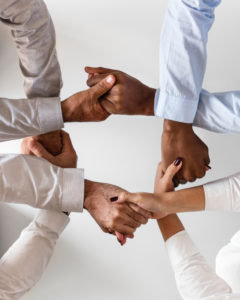I normally post these guides to political action in election years, but the lesson of the last four years is that there are serious problems in this country that require ongoing action. So here are my recommendations for groups to support and — perhaps even more importantly — actions that we can take to continue mending the fabric of our society.
America right now is like a town with a mountain road on its outskirts that's designed so poorly, the accident rate is way higher than it should be. We thought the road was fine, that Donald Trump was just a temporary rockfall, eventually to be cleared away. However, the number of voters who still approve of him, even after all that went down, and their utter immunity to facts and science are like the accident statistics that suggest that we could see many more Donald Trumps in our future, and the next one could easily possess both intelligence and self-control.
We need to fix the flaw in the road that makes such "accidents" so much more likely.
In the meantime, however, we have to keep funding the ambulance service, and so I will start there, as it's the more familiar type of political activity.
Here are my recommendations for political groups to support not just around election time, but year-round, year after year. I have monthly donations set up with each of them. Please consider doing the same, for whatever amounts you can afford. It doesn't have to be much. As I've written before, it's like voting: not so much about what any single vote can do, but what we can accomplish together if enough of us do it.
The Center for Voter Information and the Voter Participation Center are my perennial top recommendations. Their websites are pretty bare bones and low key, but they were ranked #1 and #2 by a Stanford based group that took a data-driven approach to determining the most effective place to steer political donations for 2020.
The VPC and CVI register voters and then shepherd them through the process of voting by mail, entirely by mail, and they've applied the scientific method over the years to home in on the most effective ways to do it. How should the envelopes look? What's the best time of year to do the mailings? Who should they be sent to? How many times should you re-mail someone who's not responding before you give up on them? The VPC/CVI has spent years experimenting to find the best answers.
Finally, their process is completely scalable, because it doesn't depend on human resources. The mailings are all computerized and automated, so their only limit is how much money they can raise to run a given campaign.
The VPC is a non-partisan non-profit, which means your contributions will be tax deductible. It also means that they are not allowed to distinguish between the parties in their registration and GOTV efforts, but since they target only the three most underrepresented voter demographics (people of color, unmarried women, and the young) their overwhelming effect is to help Democratic candidates and causes, since those groups tend to vote overwhelmingly Democratic.
The CVI does the same thing as the VPC, except with partisan targeting, so they're trying to only register and shepherd people who are likely to vote Democratic. However, that means that contributions to them are not tax deductible.
This community affiliate of the AFL-CIO is one of the rare groups that has had success persuading voters to cross the aisle. As a kind of virtual union for working class people everywhere, they don't just blast out messaging cold turkey. Rather, they engage voters in a gradual process that begins, not with politics but with providing them information in areas important to them, such as how to file for unemployment benefits, or get a Covid test, and so forth, building a relationship with them before saying a word about elections. They also perform constant testing of their own methods and messages, experimenting to see what works best.
After Stacey Abrams lost the 2018 Georgia gubernatorial election to the Republican Secretary of State, who used his office to suppress the minority and low-income vote to squeak out a narrow victory, she formed this organization to fight voter suppression throughout the country. This probably made the difference between victory and defeat in both the Presidential and Senatorial elections in Georgia in 2020, but moving forward, it's going to be key to many more contests, all over the country.
As the GOP loses more and more ground to demographic shifts in this country — the electorate is getting more diverse, and both people of color and new young voters tend to lean to the left — they're going to try to hold on to power more and more through voter suppression. Winning these battles will be the key to winning all the others.
Even though Democrats usually win the Presidential vote (even when they don't win in the Electoral College — but that's another issue) the GOP dominates at most lower levels. They control most of the states, for example (where most voter suppression battles will probably take place, by the way), and they have a robust and efficient machine for placing their candidates at all levels of government.
Run For Something was recently founded in order to combat that. Their mission is to recruit and empower progressive candidates at all levels, down to your local school board. This doesn't just affect the local politics; it also trains up a new generation of future national candidates.
(Note: I don't personally know much about this group's effectiveness yet, but they were recently touted by Rachel Maddow, which, combined with their unique and critical mission, was enough for me to start contributing to them myself and to include them in this list.)
Fixing The Road
Now let's talk about fixing the road. We could create a world class ambulance service that cut the accident fatality rate in half, but it would still be a problem that the road was causing so many accidents in the first place. And what is the "road" in my analogy? In my opinion, it's the divided state of our country.
It's not just that we're divided into two political camps; it's that each side sees the other as irredeemably evil. It's not our differing worldviews, but our completely divorced views of the world, of what the simple facts of the world are.
You might argue that it doesn't matter what the other side thinks of us, as long we can keep winning the electoral battles, and I will partly agree with you. Winning elections can change national conditions in ways that take some of the power out of the right-wing fear machine. However, the cultural divide also energizes right-wing electoral politics, giving them extraordinary power over their voters that we could seriously sabotage if we could make it harder for those voters to think of us as pure evil.
And it's just wrong (isn't it?) that our national life should be driven so much by hate, with hardly a twinkling of a possibility of love any more.
Anyway, this is my belief, and if you agree, I'd like us to start brainstorming about ways we can heal this divide. But I want to say up front that I'm NOT talking about political compromise, or moderating our policy goals, or anything in the political realm. I'm talking instead about completely apolitical action, cultural action, personal action.
I've created this page:
for taking and listing suggestions about actions of this sort that we might take. Browse the list and give me your own ideas. Let's all do what we can, politically and otherwise, to keep this noble experiment in diverse democracy going strong.
p.s. if you want some more purely political suggestions, here are some other action groups I currently support and that I've recommended in past blog posts. The four groups above are my top recommendations right now, but the others on this list are good, too.




